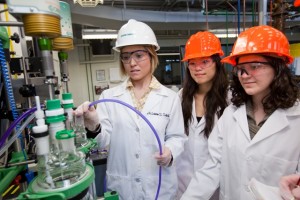
Lauren Sefcik Anderson ’04, left, assistant professor of chemical and biomolecular engineering, with students in a lab in Acopian Engineering Center.
When her grandmother had knee replacement surgery, Lauren Sefcik Anderson ’04 was only in elementary school, but she remembers wanting to help. Though she had no idea what engineering even was, she was fascinated by her grandmother’s new knees.
“I didn’t really understand why she needed new knees, but I remember thinking of it not as science fiction but rather as a complex medical problem that someone found a solution for,” recalls Anderson, assistant professor of chemical and biomolecular engineering. “I didn’t think about being the doctor. I wanted to be the person who designed the knees – what did they make it out of, how did they put it in the body, what will happen to it in a few years?”
The little girl with the big questions came to Lafayette, where she earned her bachelor’s degree in chemical engineering. After completing her Ph.D. in biomedical engineering at the University of Virginia, where she received the Faculty Senate Dissertation-Year Fellowship, she returned as a member of the faculty in 2009. It truly has brought her full circle.
Anderson found a passion for teaching when she began mentoring three senior undergraduates at the University of Virginia in their senior year capstone project as she was finishing up her doctorate.
“I remembered fondly my experiences at Lafayette and the interactions I had with my professors,” she says. “That is what brought me back. Our students are very intelligent, capable, motivated, and involved. It’s my job now to help them prepare for the next steps after Lafayette. Some of that mentoring occurs in the classroom, but it’s the conversations outside of class and in the research lab that are really exciting and rewarding, for both of us.”
James Ferri, associate professor of chemical engineering, mentored Anderson through the graduate school application process and played a role in helping her secure a National Science Foundation (NSF) Graduate Research Fellowship, which funded her first three years of graduate school. As colleagues, the pair secured a $357,106 Major Research Instrumentation grant from the NSF to equip the College’s Center for Molecular Bioengineering with state-of-the-art instrumentation to enhance undergraduate research projects and expand teaching capabilities in biomolecular engineering.
Anderson developed Biomolecular Engineering, a special topics course that is an introduction to the field of bioengineering. Students learn about engineering complex living systems for applications ranging from the development of human tissues to improving the effectiveness and delivery of clinical medicine. This coming spring, she’ll offer a new course called Biomaterials Science. The introductory-level course will focus on the structure-property relationship for biomaterials and will integrate materials science, engineering, chemistry, biology, and math. She also teaches one of the core chemical engineering courses, Transport Phenomena, and its associated hands-on experience, Experimental Design I.
“Hands-on experiences are an important teaching tool,” she says. “I really enjoy teaching in the lab because it’s usually where the higher-order questions are asked and deeper conversations occur.”
As a scholar, Anderson has combined her expertise in chemical engineering and biomedical engineering to study the interactions cells have with biological materials.
“As a chemical engineer, I am trained to design and optimize molecular processes. As a biomedical engineer, I apply this expertise to a biomolecular process: growing new tissues. The body is made up of different types of tissues, tissues are comprised of various cells, and cells are made of different types of molecules,” she explains. “Tissue engineering, then, is really just a complex scaling problem of a molecular process, a task that is well-suited for chemical engineers. As a chemical engineer, you have to be okay with designing processes with inputs and outputs that you can’t necessarily see or touch. I like thinking abstractly; the challenge is part of the appeal.”
Chemical engineering majors Kevin Ling ’12 (Winchester, Mass.) and Ashley Kaminski ’13 (Springfield, Pa.) are conducting undergraduate research as EXCEL Scholars on Anderson’s research project in conjunction with the Fraunhofer Institute of Applied Polymer Chemistry in Potsdam-Golm, Germany. The team is studying cell-material interactions on “smart” biomaterials called thermoresponsive polymer brushes, which can be used to engineer new tissues. Anderson presented their work at the European Meeting of the Tissue Engineering and Regenerative Medicine International Society in Granada, Spain, this year.
Anderson remains just as involved on campus as she was as a student. She serves on the Student Life Committee and Graduate and Fellowship Advisory Committee. She also is the outreach coordinator and library liaison for her department and advises first-year students. She has mentored students for honors thesis and independent study, has published her work in multiple peer-reviewed journals, and has made presentations on her research in the U.S. and abroad.

1 Comment
Comments are closed.